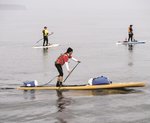There was a moment last summer when those of us who were following the Race to Alaska had a collective jaw drop.
It was June 25, 2017 when guy named Karl Kruger hit the dock in Ketchikan, rang the …
This item is available in full to subscribers.
We have recently launched a new and improved website. To continue reading, you will need to either log into your subscriber account, or purchase a new subscription.
If you had an active account on our previous website, then you have an account here. Simply reset your password to regain access to your account.
If you did not have an account on our previous website, but are a current print subscriber, click here to set up your website account.
Otherwise, click here to view your options for subscribing.
* Having trouble? Call our circulation department at 360-385-2900, or email our support.
Please log in to continue |
|


There was a moment last summer when those of us who were following the Race to Alaska had a collective jaw drop.
It was June 25, 2017 when guy named Karl Kruger hit the dock in Ketchikan, rang the finish-line bell and became the first person to finish the R2AK on a stand-up paddleboard (SUP) in 14 days, 6 hours and 17 minutes. After we had exhausted the global supply of the various forms of saying "Wow," we looked at each other and thought, "That, how can we get more of that ... but maybe not all the way to Alaska." Last week, the Northwest Maritime Center launched its answer to that question with our new race designed to challenge that same sort of physicality through trial by water but a little closer to home. We're calling it Seventy48: 70 miles in 48 hours, an unsupported, human-power race from Tacoma to Port Townsend in the two days leading up to the R2AK.
Because it was inspired by the same energy as the R2AK, Seventy48 similarly has few rules: Get a boat without a motor, start at the head of the Thea Foss Waterway at 5 p.m. on June 11 and get to Port Townsend before the R2AK Ruckus officially begins at 5 p.m. on June 13. No classes, no handicaps, no weather delays, and in addition to the race entry fee, each team kicks in an ante of $100 toward the prize. Whoever wins gets it.
The race website went live last Wednesday (seventy48. com), and since then, we have been answering a ton of questions. To give you a head start, here are the top three:
Q. Why human power only, why not sails?
A. There are already plenty of sailing races, and from the looks of things, sailboats will always win the R2AK. We wanted to create that same kind of challenge on a limited time commitment. Sailing 70 miles in two days is pretty easy. Karl Kruger averaged 50 miles a day on his SUP trip to Alaska, the rowboat that finished averaged more like 30. This is going to be a challenge.
Q. Why start at 5 p.m., won't it get dark soon?
A. Yes, it will, and that's where knowledge and seamanship can help overcome sheer speed. It's fine to be on the water at night as long as you have the right equipment and know what you are doing.
Q. What type of boat is going to win?
A. We have no idea. This is a race that's never been done before. It's likely that we'll have rowing shells racing against kayaks, outrigger canoes, surf skis, SUPs – there are even some pedal-driven contraptions that are in development. Each of the boats has its advantages, depending on the crew and what the weather does. In flat, calm water, a collegiate team with a rowing shell could do pretty well. On a rough day, they'll sink.
The mission of the Maritime Center essentially boils down to two things: engage people with the water through powerful experiences, and continue to find ways to bring engagement, visitors and attention to the maritime part of our community. It does that with the Wooden Boat Festival, Race to Alaska, school programs, sailing lessons, boatbuilding classes and classes for professional mariners.
By all early indications, Seventy48 is the next manifestation of maritime engagement.
Hope you enjoy it, too.
Jake Beattie is executive director of the Northwest Maritime Center in Port Townsend. He's also a small-boat enthusiast and a founder of the Race to Alaska. His column on maritime concerns is published monthly in The Leader.